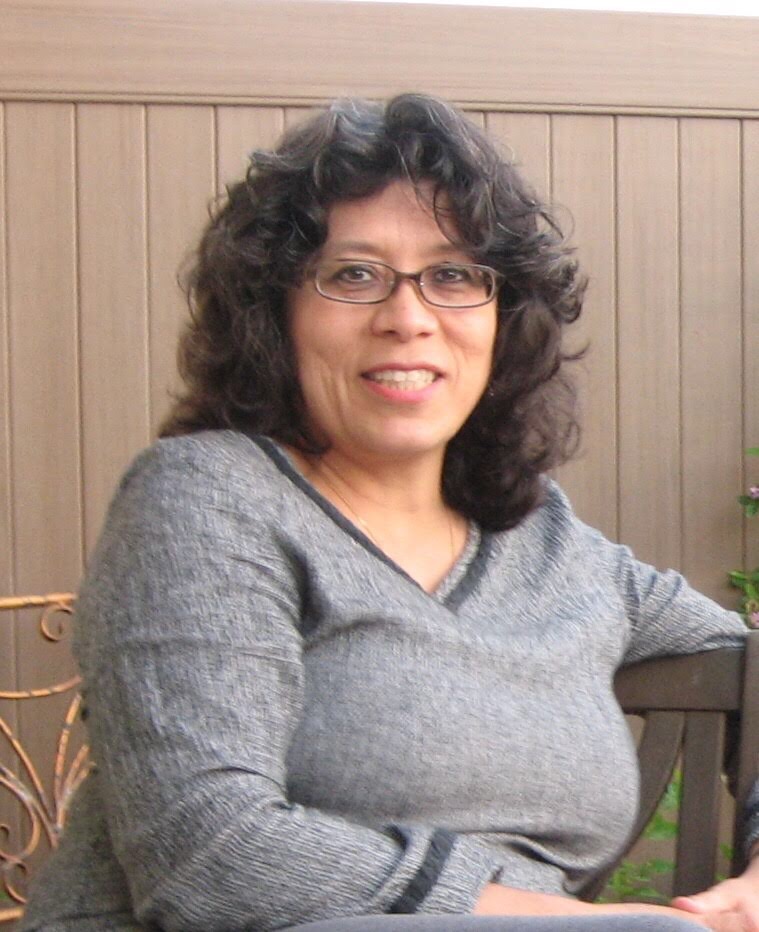I am on leave in Fall 2025. I may slower to respond to email.
“The fact that history is also produced outside academia has largely been ignored in theories of history.”– Michel-Rolph Trouillot. Silencing the Past, Power and the Production of History (1995).
I am a Peruvian historian specialized in the social and political history of the Andean region during the national period, Peru, in particular. After graduating as a licenciada in History at the Pontificia Universidad Católica del Perú (Lima), in 1986, I took a teaching position at the Universidad Nacional de Huamanga, in Ayacucho. At that time, Ayacucho’s mostly rural and Quechua-speaking hinterland had become the epicenter of the political violence unleashed by Shining Path’s (Sendero Luminoso’s) insurgency in 1980. Deemed the biggest insurrection in the history of Peru, and the bloodiest in modern Latin America, the inner war, which spanned from 1980 to 2000, claimed nearly 70,000 lives, most of them Quechua-speaking peasants. My experience in Ayacucho, which was prior to my pursual of graduate studies in the U.S., turned out to be decisive in my professional choices. Henceforth, the largest part of my research has been devoted to the study of the role of Andean peasant society in Peru’s national life.
My work calls the attention on the importance of late eighteenth-century, and nineteenth-century political developments in shaping modern conceptions nationhood, citizenship, and “race” in Peru. I have also investigated the historical relationship between the peasants and the militaries, and the role of war and the army in the construction of the state. I have published widely on these and other subjects concerning contemporary politics (scroll down to see and download some of my publications). My book The Plebeian Republic: The Huanta Rebellion and the Making of the Peruvian State (2005), won the Howard F. Cline Award for “the best book on indigenous history in Latin America.” Its Spanish revised and expanded version, La República Plebeya (2014) was voted “the best book of History of 2014” by international survey of historians specialized in Peru. This 2014 interview with anthropologist Javier Torres Seoane, and this other 2021 interview with historian Manuel Burga director of Peru’s Museum of Memory (LUM), both in Spanish, provide a good sense of the book.
I am also working on the long term project “The Wars Within: Civil Strife, National Imaginings, and the Rural Basis of the Peruvian State,” a study of nineteenth-century civil wars, local governance, and state formation, which draws inspiration in Peru’s most recent armed conflict. The project was awarded yearlong fellowships form the National Endowment for the Humanities (NEH), the Stanford Humanities Center, and the Center for Historical Studies at UT-Austin. Offsprings of this project include the essays: “La Guerra que no cesa” (Ceaseless War) published in France (2013), “Violencia en clave étnica” (Lima, 2021) (download from “Publications,” below), and “The Paths of Terrorism in Peru,” in The Cambridge Global History of Terrorism (edited by Richard English), 2021 (download from “Publications”, below). For an interview I offered on this chapter in English check here and in Spanish here. Several of these essays are included in my book Violencias fundacionales: Ensayos sobre racismo, guerra y política en el Peru (Lima: La Siniestra, 2025).
My analysis of the past is closely intertwined with my observation of the present. As such, I am a frequent commentator on politics in the Peruvian media, and I write a monthly column for the newspaper La República. I have also offered interviews for the international media, including Le Monde, O’Globo, El País, Público, and Jacobin Latin America, among others. For a sample in English check this 2021 interview with The Conversation. For Spanish, check this 2023 interview with Public Radio in Spain. For more, see the section “Videos & Interviews” below.
- Latin America/ The Andean region, Peru, 18th-21st centuries.
- Rural history, indigenous history, the peasants and the army.
- The State, race/racism, and ethnicity, nationalism, world history.
- Political violence, historical memory, history of terrorism.
- Historical methods, history and anthropology, theory of history and historiography.
- “A Radical Liberal Experiment in the Fight for Indigenous Rights in Peru: La Sociedad Amiga de los Indios, 1867-1872″. The Friends of the Indians Society, (FIS), was an organization founded Peru, in 1867 to defend the rights of indigenous peasants in a context of aggressive encroachment on their lands . Whereas most studies have linked its fate of that of its founder, Puno intellectual, writer and activist, Colonel Juan Bustamante, my project analyzes the Society’s provincial networks and its relationship with peasant grassroots leaders, to argue that despite –or together with– its paternalistic undertones, the most radical strands of the FIS advocated for a radical form of liberalism.
- “The Proscribed Heroe: Historiography and memory of Tupac Amaru II.” This project explores the long-term legacies of the insurgency of Tupac Amaru II (1780-1781) in the historiography and in the official and popular memory of Peru, from its aftermath to the present.
- BOOKS

Violencias fundacionales: Racismo, guerra y política en el Perú [Foundational Violences: Racism, War and Politics in Peru]. Lima: La Siniestra Ensayos, 2025.
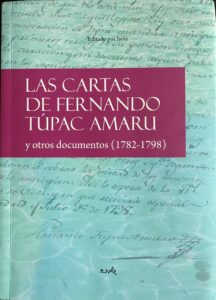
Introductory study to: Las cartas de Fernando Túpac Amaru y otros documentos, 1782-1798 [The Letters of Fernando Túpac Amaru and other Documents, 1782-1798] (Isloe: Lima, 2025).
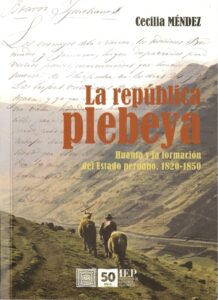
La República Plebeya. Huanta y la formación del Estado Peruano, 1820-1850.Lima: IEP, 2014. Revised and expanded translation of The Plebeian Republic (2005). Voted “the best book of History of 2014” in Peru.

The Plebeian Republic: The Huanta Rebellion and the Making of the Peruvian State, 1820-1850. Durham and London: Duke University Press, 2005. Winner of the 2007 CLAH Howard F. Cline award for the best book on indigenous history in a Latin America. Download the introduction here.
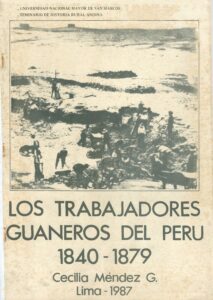
Los Trabajadores Guaneros del Perú, 1840-1879 [The Guano Workers of Peru, 1840-1879] Lima: Seminario de Historia Rural Andina, Universidad Nacional Mayor de San Marcos, 1987.
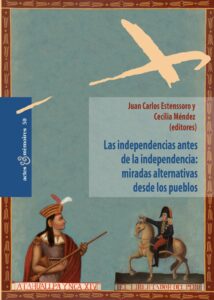
Coedited with Juan Carlos Estenssoro, Las Independencias antes de la independencia: miradas alternativa desde los pueblos [Independences Before Independence: Alternative Views From the Pueblos] Lima: Instituto Francés de Estudios Andinos, IFEA. 2021.
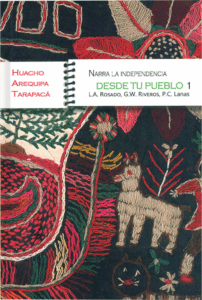
Coedited with Juan Carlos Estenssoro, Narra la Independencia desde tu pueblo, I: Huacho, Arequipa y Tarapacá (Lima, IEP, 2017)
ARTICLES & BOOK CHAPTERS (selected)
- “The Paths of Terrorism in Peru, Nineteenth to Twenty-first Centuries,” in The Cambridge History of Terrorism Richard English, (ed.) 2021, pp. 420-452. Download here)
- “Violencia en ‘clave étnica’ o la sombra de Túpac Amaru II en las narrativas historiográficas de la independencia del Perú” [Violence in ‘ethnic code’ or the Specter of Tupac Amaru II in the Historiographical Narratives of the independence of Peru] in Juan Carlos Estenssoro y Cecilia Méndez (eds), Las Independencias antes de la independencia: miradas alternativa desde los pueblos Lima: IEP/ IFEA. 2021, pp. 453-520.
- “La Guerra que no cesa: Guerras civiles, imaginario nacional y la formación del estado en el Perú”[Ceaseless War: Civil Wars, National Imaginings, and the Formation of the State in Peru]. In Clément Thibaud (et. al), L’ Atlantique Révolutionnaire. Bécherel: Editions Les Perséides (France), 2013: 379-420 (Notice the name of this article is mistaken in the table of contents).
- “De indio a serrano: nociones de raza y geografía en el Perú [From Indian to Highlander: Notions of Race and Geography in Peru). Histórica vol. XXXV, 1, 2011: 53-103 [2012] reprinted in Martín Tanaka (ed). Antología del Pensamiento Crítico Peruano Contemporáneo Buenos Aires: CLACSO, 2016, pp. 577- 617.
- “The Power of Naming, or the Construction of Ethnic and National Identities in Peru: Myth, History and the Iquichanos”. In Past and Present (Oxford U. Press), 171, May 2001, pp. 125-160. In Spanish: El poder del nombre o la construcción de identidades nacionales y étnicas en el Perú: mito, historia y los iquichanos Lima: Instituto de Estudios Peruanos, IEP, Documento de Trabajo 115, Serie Historia, 2002.
- “Incas sí, indios no apuntes para el estudio del nacionalismo criollo en el Perú” [“Incas, sí, indios No: Notes on Peru’s Creole Nationalism and its contemporary crisis,” 1st Spanish ed, IEP, 1993; 2nd Spanish ed, IEP, 1995; 1st English ed, in JLAS 1996, ] reprinted in Racismo y Enticidad, with Christine Hunefeldt and Marisol de la Cadena. Lima: Ministerio de Cultura, 2014.
- “‘¿Una Larga Espera’? Ironías de la Cruzada Postcolonialista en Hispanoamérica,” Histórica Vol. XXX Nro. 2, Dec. 2006 [2008]. A critique to the so-called postcolonial theory from a Latin American perspective (for an updated edition see: Cuadernos CLACSO 27, Le Monde Diplomatique. La Paz, June, 2010.
- “El Inglés y los Subalternos: Comentario a los artículos de Florencia Mallon y Klor de Alva” (English and the Subalterns: Commentary to the articles of Florencia Mallon and Jorge Klor de Alva). in Pablo Sandoval, editor, Repensando la Subalternidad Lima: IEP, 2009. I argue, against a trend that claims “globalization” is blurring national boundaries, that place and language matter in academia.
- “Militares Populistas: Ejército, Ciudadanía y Etnicidad en el Perú.” [Populist Militaries, the Army, Citizenship, and Ethnicity in Peru]. In Pablo Sandoval, editor, Repensando la Subalternidad. Lima: IEP, 2009. This article analyzes the long term relationship between the peasants and the army in order to understand popular appeal of civilian and military dictatorships.
- “Las Paradojas del Autoritarismo: Ejército, Campesinado y Etnicidad en el Perú: siglos XIX al XXI”(The Paradoxes of Authoritarianism: The Army the Peasantry, and Ethnicity in Peru). Iconos, Revista de Ciencias Sociales (FLACSO, Quito) no. 26 Sept. 2006: 17-34.
- “Populismo Militar y Etnicidad en los Andes” (Military Populism and Ethnicity in the Andes), presentation of dossier. Iconos, Revista de Ciencias Sociales, Quito: FLACSO no 26, 2006. Introduction of a special dossier on Militaries and Indians in Bolivia, Ecuador, and Peru: 12-16.
- In coauthorship with Carla Granados, Las guerras olvidadas del Perú: formación del Estado e imaginario nacional” (“Peru’s forgotten wars, state formation and national imaginings). Revista de Sociologia e Politica (Brazil) vol 20 nr 42, June 2012: 57-71.
- “Tradiciones liberales en los Andes: militares y campesinos en la formación del estado peruano.“ (Liberal Traditions in the Andes: militaries and peasants in the formation of the national State in Peru). In Estudios Interdisciplinarios de America Latina y el Caribe (EIAL) University of Tel Aviv. vol 15, no. 1, 2004: 35-63.
- “Una vez más La Pena de Muerte” (The Death Penalty, Once again).Crónicas de Historia del Derecho, 1994: 51-63. Revised and expanded from “Penalidad y Muerte en el Perú” Márgenes No 1. Lima: Casa de Estudios del Socialismo, 1987.
OPINION, AND ANALYSIS, CURRENT AFFAIRS (Highlights)
- The last Sunday of each month, I write a column for the newspaper La República, in Peru: “Chola Soy”. Expore it!
- “La independencia: una revolución olvidada,” in Ojo Público, July 28, 2020 Featured in the Latin American Historical Association (LASA) Web News
- “San Martín no debe estar en el centro de la memoria de la independencia”La República July 28, 2016 [Note: This title was changed by the editors, my title was “No una sino muchas independencias: “Not one but many independences”].
- “El Mundo al Borde del Historicidio” . Ojo Público.com. April 19, 2015. Opinion essay that discusses how neoliberalism blends in Peru with the legacies of terrorism to de-historicize notions of nation and citizenship.
- “Obama y Humala: ¿Democracia y Nacionalismo? Revista IDEELE 215, December 2011“. Opinion essay on how presidential candidates Obama in the U.S. and Humala in Peru faced racist attacks from conservative critics. The case exemplifies how nationalism, and political claims of national belonging can mean something very different in different countries.
- ¿Qué son y qué quieren los etnocaceristas? Entrevista con la historiadora peruana Cecilia Méndez, por Pablo Stefanoni[Who are the etnocaceristas and what do they want?]. Interview with Pablo Stefanoni, Viejo Topo, Nr. 205-206, April, 2005, pp. 25-31.
Prizes & Distinctions
- 2014. La República Plebeya: La rebelión de Huanta y la formación del Estado Peruano (IEP, 2014) selected “the best book of History” in Peru.
- 2010 Latin American and Iberian Studies Program Faculty Award for Exemplary Mentorship to Graduate and Undergraduate Students.
- 2007 Howard Cline Memorial Prize for the book “The Plebeian Republic” awarded by the Conference on Latin American History.
- 1995 Mildred and Herbert Weisinger Dissertation Prize for the Best Doctoral Dissertation in Progress, SUNY at Stony Brook.
- 1986 B.A. Thesis “Los Trabajadores Guaneros del Perú” approved as “outstanding” with “mention for publication” (published in 1987).
Fellowships (selected)
- University of California Humanities Research Institute (UCHRI), Fall 2020 Residential Fellowship to work on Civil wars and terrorism in Peru.
- National Endowment for the Humanities (NEH) 2012-2013 Research project “The Wars Within: Civil Strife, National Imaginings, and the Rural Bases of the Peruvian State”
- Stanford Humanities Center Fellowship 2010-211. Research
project: “The Wars Within: Civil Strife, National Imaginings, and the Rural Bases of the Peruvian State.” - University of Texas-Austin, Institute for Historical Studies Fellowship 2010-2011. “Research project: “The Wars Within: Civil Strife, National Imaginings, and the Rural Bases of the Peruvian State.” (declined)
- Yale University Program in Agrarian Studies Fellowship 1996-1997
Research project: “Peasant Justice and State Rule in Huanta 1830-1879” - Government of Spain Fellowship for “Foreign Hispanists”, 1994. Project: “Rebellion without resistance”. Doctoral dissertation research in the Archive of Indies, Seville, Spain.
- Harry Frank Guggenheim Foundation Doctoral Fellow 1993-1994.
Fellowship to write up dissertation. - Social Science Research Council Doctoral Fellow 1991-1992.
Dissertation: “Rebellion Without Resistance: Huanta’s Monarchist Peasants and the Making of the Peruvian State.” - Wenner-Gren Foundation for Anthropological Research. Doctoral Fellow 1991-1992 Dissertation: “Rebellion Without Resistance: Huanta’s Monarchist Peasants and the Making of the Peruvian State.”
Teaching Abroad
- Invited Professor at l’Ecole des hautes études en sciences sociales (EHESS), Paris (May-June, 2019).
- Invited professor at the Summer course “Visiones de lo Colonial: usos y abusos de un concepto”. Universidad Autónoma de Madrid (September 2018).
- Instituto de Estudios Peruanos, Lima
Various workshops on the militaries and the peasants, civil wars and the state, and the production of silences in historiographical narratives (2010, 2011, 2012). - University of the Philippines, Quezon City, 2008.
Workshop on “Alternative Methodologies” for Doctoral Students of the “Global South”, Sponsored by SEPHIS. - Universidad Nacional de San Cristobal de Huamanga, Ayacucho, Peru. Various workshops for history students.
Videos and Interviews (Highlights)
- Explore my monthly column the newspaper La República (in Spanish).
- Watch my 2025 interview with faculti.net on my chapter “The Paths of Terrorrism in Peru, 19th to 21st centuries” (in English).
- Watch my interview with historian Manuel Burga, director of El Lugar de la Memoria, LUM, about my book La República Plebeya, July 22, 2021 (in Spanish).
- Watch my interview with journalist César Hildebrandt about Peruvian politics (December 16, 2024).
- Watch my conversation with anthropologist Javier Torres Seoane about my book La República Plebeya ( Lima on September, 2014).
- Read my interview with José Miguel Munive , “La herencia del terrorismo impide pensar en los rebeldes del pasado” (Revista Ideele 237, April 18, 2014), on how the present shapes our understanding of the past
- Watch the video of the presentation of La República Plebeya in the Instituto de Estudios Peruanos, Lima, September 6, 2014.
- Read my interview with Pablo Stefanoni, ¿Qué son y qué quieren los etnocaceristas? Entrevista con la historiadora peruana Cecilia Méndez, por Pablo Stefanoni[Who are the etnocaceristas and what do they want?] in El Viejo Topo, Nr. 205-206, April, 2005, pp. 25-31.

